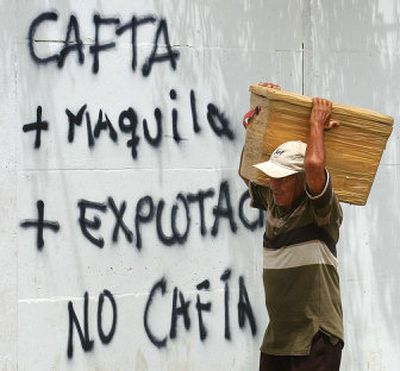Senate OKs plan for trade agreement

WASHINGTON – The U.S. Senate on Thursday approved language to implement a Central American free trade agreement, giving President Bush a solid victory despite fears within his party about the domestic consequences of the pact.
The bipartisan 54-45 vote in the Senate belies a much more difficult road in the House of Representatives, which is traditionally more hostile to free-trade deals. Earlier Thursday, the House Ways and Means Committee approved the legislation, but prospects on the House floor are uncertain. A vote is expected this month.
The agreement covers trade with Costa Rica, El Salvador, Guatemala, Honduras and Nicaragua, and is linked by a separate deal with the Dominican Republic.
The Bush administration has been pushing the deal for more than a year, portraying it as an economic gain for the United States and as a foothold for free-market capitalism in the developing countries of Central America. Advocates also portrayed the agreement as a means to fend off growing Chinese textile exports by ending requirements that tariff-free clothes exports from Central America use U.S. materials.
Winning CAFTA is a top priority for Bush, who’s looking for some victories in Congress to give his domestic agenda some momentum. But the Senate vote was one of the closest trade votes in years. Voting in favor were 43 Republicans, 10 Democrats and one Independent. Voting against were 12 Republicans and 33 Democrats, signaling wariness over the benefits of international commerce and globalization.
“It’s an opportunity – first in a year or so – to vent concerns about trade policy, including China currency, outsourcing, trade deficits, things of that nature,” said Sen. Charles Grassley, R-Iowa, the Senate manager of the bill.
Advocates argued that the pact would open a market of 44 million people to U.S. goods. Critics said the average income in the CAFTA countries is so low that it would hardly make a dent in the U.S. trade balance.
Trade deals typically face opposition from Democrats worried about open trade with countries that don’t abide by labor and environmental standards as strong as the United States’ and from Republicans worried about lost jobs back home.
This deal was no different. Its stiffest opposition comes from lawmakers in sugar-industry states who believe sugar imports from Central America will hurt U.S. producers.
The administration did try to soften the blow on sugar beet and sugar cane growers by permitting the Commodity Credit Corp. to purchase excess imported sugar and keep it off the domestic sugar market over the next two years. It also would authorize a study into the production of ethanol, a gasoline additive, from sugar. While those concessions won the votes of some senators, including both senators from Florida, it didn’t appease the sugar industry.
“We’re a very large importer of sugar – CAFTA seeks to compound an already ugly situation,” said Republican Sen. Larry Craig of Idaho, the country’s second largest sugar beet producer. “I’m not prepared to trade away an industry so vital to my state to the overall well-being of some other country’s sugar industry.”
To ease some Democratic concerns, U.S. Trade Representative Rob Portman agreed to request $40 million a year through 2009 to help CAFTA countries better enforce labor and environmental protections. The administration also agreed to provide $30 million a year for five years to Guatemala, El Salvador and the Dominican Republic to help farmers affected by increased agricultural imports from the United States.